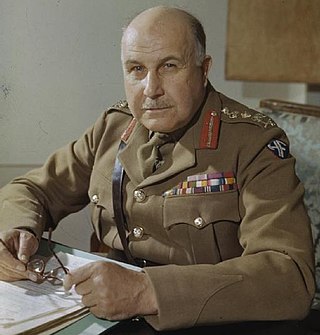
Field Marshal Henry Maitland Wilson, 1st Baron Wilson,, also known as Jumbo Wilson, was a senior British Army officer of the 20th century. He saw active service in the Second Boer War and then during the First World War on the Somme and at Passchendaele. During the Second World War he served as General Officer Commanding-in-Chief (GOC-in-C) British Troops in Egypt, in which role he launched Operation Compass, attacking Italian forces with considerable success, in December 1940. He went on to be Military Governor of Cyrenaica in February 1941, commanding a Commonwealth expeditionary force to Greece in April 1941 and General Officer Commanding (GOC) British Forces in Palestine and Trans-Jordan in May 1941.

Field Marshal Archibald Percival Wavell, 1st Earl Wavell, was a senior officer of the British Army. He served in the Second Boer War, the Bazar Valley Campaign and the First World War, during which he was wounded in the Second Battle of Ypres. In the Second World War, he served initially as Commander-in-Chief Middle East, in which role he led British forces to victory over the Italian Army in Eritrea-Abyssinia, western Egypt and eastern Libya during Operation Compass in December 1940, only to be defeated by Erwin Rommel's Panzer Army Africa in the Western Desert in April 1941. He served as Commander-in-Chief, India, from July 1941 until June 1943 and then served as Viceroy of India until his retirement in February 1947.

General Sir Richard Nugent O'Connor, was a senior British Army officer who fought in both the First and Second World Wars, and commanded the Western Desert Force in the early years of the Second World War. He was the field commander for Operation Compass, in which his forces destroyed a much larger Italian army – a victory which nearly drove the Axis from Africa, and in turn, led Adolf Hitler to send the Afrika Korps under Erwin Rommel to try to reverse the situation. O'Connor was captured by a German reconnaissance patrol during the night of 7 April 1941 and spent over two years in an Italian prisoner of war camp. He eventually escaped after the fall of Mussolini in the autumn of 1943. In 1944 he commanded VIII Corps in the Battle of Normandy and later during Operation Market Garden. In 1945 he was General Officer in Command of the Eastern Command in India and then, in the closing days of British rule in the subcontinent, he headed Northern Command. His final job in the army was Adjutant-General to the Forces in London, in charge of the British Army's administration, personnel and organisation.
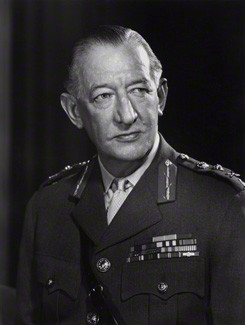
Field Marshal Sir Archibald James Halkett Cassels, was a senior British Army officer who served as Chief of the General Staff (CGS), the professional head of the British Army, from 1965 to 1968. As a young man he was a first-class cricket player, initially playing in India for the Europeans against the Hindus in the Lahore Tournament and going on to play for a Punjab Governor's XI against Northern India team and for a Viceroy's XI against the Roshanara Club. He later played for the British Army cricket team against the RAF at The Oval and then played for the Egyptian national side against HM Martineau's XI in Alexandria.
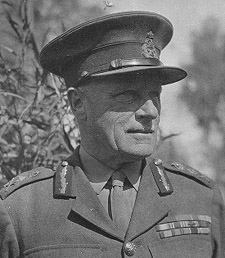
General Sir Edward Pellew Quinan was a British Army commander during the Second World War. In the early part of his career, he was involved in Indian Army campaigns in Afghanistan and Waziristan on the North West Frontier of the Indian Empire, in the days of the British Raj. During the First World War he served with the Indian Army forces in France and Mesopotamia, and was wounded. During the Second World War, Quinan commanded the British and Indian Army forces in the Anglo-Iraqi War, the Syria–Lebanon campaign, and the Anglo-Soviet invasion of Iran. He continued serving in the Middle East until 1943, when he returned to India to command the North West Army, but retired later the same year due to a downgrading of his fitness status.
The Far East Command was a British military command which had 2 distinct periods. These were firstly, 18 November 1940 – 7 January 1942 succeeded by the American-British-Dutch-Australian Command (ABDACOM), and secondly, 1963–1971 succeeded by Australia, New Zealand, and United Kingdom Force

Lieutenant-General Sir Thomas Jacomb Hutton, was a British Army officer who held a variety of vital staff appointments between the First and Second World Wars, ultimately commanding the Burma Army during the early stages of the Japanese conquest of Burma in early 1942.
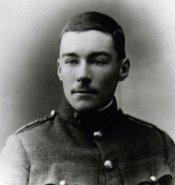
Lieutenant General Sir Philip Neame, was a senior British Army officer and a recipient of the Victoria Cross, the highest award for gallantry in the face of the enemy that can be awarded to British and Commonwealth forces, and the winner of an Olympic Games gold medal; he is the only person to achieve both distinctions.

General Sir Richard Nelson "Windy" Gale, was a senior officer in the British Army who served in both world wars. In the First World War he was awarded the Military Cross in 1918 whilst serving as a junior officer in the Machine Gun Corps. During the Second World War he served with 1st Parachute Brigade and then the 6th Airborne Division during the D-Day landings and Operation Tonga in 1944. After the end of the conflict, Gale remained in the army and eventually, in 1958, succeeded Field Marshal The Viscount Montgomery as Deputy Supreme Allied Commander Europe.

Middle East Command, later Middle East Land Forces, was a British Army Command established prior to the Second World War in Egypt. Its primary role was to command British land forces and co-ordinate with the relevant naval and air commands to defend British interests in the Middle East and eastern Mediterranean region.
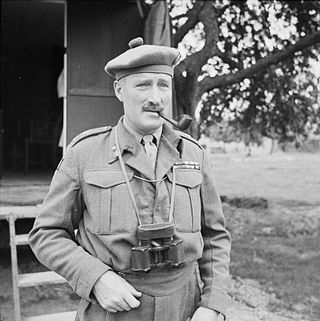
General Sir Neil Methuen Ritchie, was a British Army officer who served in the First and Second World Wars. During the Second World War he commanded the British Eighth Army in the North African campaign from November 1941 until he was dismissed in June 1942 after a disastrous defeat in the Battle of Gazala.
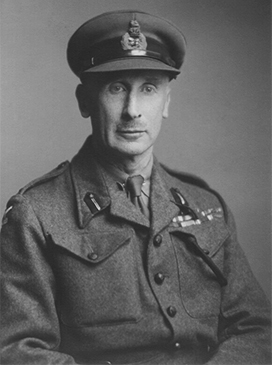
General Sir Evelyn Hugh Barker, was a British Army officer who saw service in both the First World War and the Second World War. During the latter, he commanded the 10th Brigade during the Battle of France in 1940, the 49th Infantry Division and the VIII Corps in the Western Europe Campaign from 1944 to 1945.
General Sir Alfred Reade Godwin-Austen, was a British Army officer who served during the First and the Second World Wars.
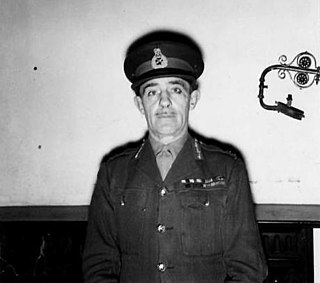
Major General Horatio Pettus Mackintosh Berney-Ficklin, was a British Army officer who served in both the First and Second World Wars. During the latter, he commanded for just over three years – from July 1940 until August 1943 – the 5th Infantry Division, the most widely travelled division of the British Army during the Second World War.

General Sir Kenneth Thomas Darling was a senior British Army officer who after serving with distinction during the Second World War was Commander-in-Chief (C-in-C) of Allied Forces Northern Europe 1967–69.

Aldershot Command was a Home Command of the British Army.
Lieutenant General Sir Henry Beresford Dennitts Willcox KCIE CB DSO MC was a British Army officer who served during World War I and World War II.
Lieutenant General Sir Roger Herbert Bower, was a senior British Army officer who served in the Second World War and later became General officer commanding (GOC) Malaya Command from 1956 to 1957.
General Sir Alan Fleming Hartley, was a British Indian Army officer during the Second World War.

Major General William Donovan Stamer CB, CBE, DSO, MC was a British Army officer who was commissioned into the North Staffordshire Regiment at the outbreak of the First World War and served in the Army until retirement in 1948, finishing his career with the temporary rank of major-general and serving as General Officer Commanding Sudan and Eritrea.














